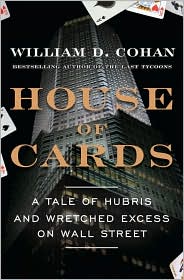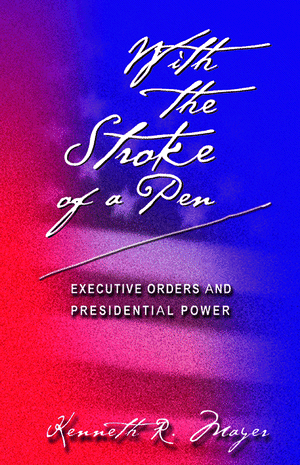The WSJ’s Deal Journal posts a couple excerpts from the new book "House of Cards," including the one by Jimmy Cayne in which he expresses his anger towards Tim Geithner, President of the Fed’s NY branch at the time.
Bear Stearns’ Jimmy Cayne’s Profane Tirade Against Treasury’s Geithner
From Deal Journal:
"The Wall Street stages of grief go something like this: Anger, bargaining, acceptance, tell-all biography.
Deal Journal exclusively brings you two detailed excerpts from House of Cards: A Tale of Hubris and Wretched Excess on Wall Street by William D. Cohan, to be published in March, 2009…
Consider, for instance, this rant that Cohan describes from bridge-playing Bear Stearns CEO Jimmy Cayne describing his feelings on Geithner’s decision to sell Bear Stearns:"
Asked about Geithner’s comments and his decision regarding opening the discount window to Wall Street after Bear had been sold for $2 a share and not earlier, Jimmy Cayne became spitting angry.
“The audacity of that p—k in front of the American people announcing he was deciding whether or not a firm of this stature and this whatever was good enough to get a loan,” he said. “Like he was the determining factor, and it’s like a flea on his back, floating down underneath the Golden Gate Bridge, getting a h–d-on, saying, ‘Raise the bridge.’ This guy thinks he’s got a big d–k. He’s got nothing, except maybe a boyfriend. I’m not a good enemy. I’m a very bad enemy. But certain things really—that bothered me plenty. It’s just that for some clerk to make a decision based on what, your own personal feeling about whether or not they’re a good credit? Who the f–k asked you? You’re not an elected officer. You’re a clerk. Believe me, you’re a clerk. I want to open up on this f—-r, that’s all I can tell you.”…
During congressional hearings on April 3 that followed the events of March, just as certainly as little boys on sleds follow a winter snowfall, Bernanke and Geithner further explained their thinking at this crucial moment in the history of American capitalism. “We made the decision to [open the discount window] on Sunday,” Bernanke said. “At the time we did it, we didn’t know whether the Bear Stearns deal would be consummated or not, and we wanted to be prepared in case it wasn’t consummated, that we would need to have this facility in order to protect what we imagined would be pressure on the other dealers subsequently to that. Whether opening up earlier would have helped or not is very difficult to say. Perhaps President Geithner can add to this. But Bear Stearns was losing customers and counterparties very quickly. They were downgraded on Friday. And we did lend them money, of course, to keep them [going] into the weekend, but it’s not at all obvious to me that it would have been sufficient to prevent their bankruptcy.”
Like Bernanke, Geithner also defended the decision to open the discount window on Sunday evening based upon the events that occurred at Bear Stearns on Friday. “Friday morning we took the exceptional step, with extreme reluctance, with support of the Board of Governors and the Treasury, to structure a way to get them to the weekend, so that we could buy some time to explore whether there was a possible solution that would have them acquired and guaranteed,” he said, noting that “the scale of the loss of confidence” in Bear Stearns was extraordinary. “The number of customers and counterparties that sought to withdraw funds” and the “actions by rating agencies” to downgrade Bear’s credit “accelerated that dynamic, despite the access to liquidity and despite the hope that that might buy some time.”
Geithner also defended the Fed’s decision not to open the discount window until Sunday night, after Bear could have benefited from it. “The way the Federal Reserve Act is designed, and the way we think about the discount window for banks, is we only allow sound institutions to borrow against collateral in that context,” he said. “I can only speak personally for this, but I would have been very uncomfortable lending to Bear, given what we knew at that time.” He said that both the opening of the Fed window and the earlier creation of the facility “were exceptionally consequential acts, taken with extreme reluctance and care, because of the substantial consequences it would have for moral hazard in the financial system going forward. And I do not believe it would have been appropriate for us to take that act Sunday night if we had not been faced with the dynamics that were precipitated by, accelerated by, the looming prospect of a Bear default.”…
Wall Street executives immediately appreciated the import of the Fed’s decision. “This is a five-vodka event,” one said. “Liquidity is no longer an issue.”
 But, by and large, the Bear Stearns executives were furious. They had been lobbying the Fed for months to take this very action. Just fifteen minutes after the firm had been dispatched, for a pittance, into the waiting arms of JPMorgan, the Fed moved at last. Only the most diplomatic among them, such as Alan Schwartz, were able to convey a professional understanding of how their competitors would benefit at Bear Stearns’s expense, and claim to be okay with it. “One part of me was thrilled they were opening the window,” one executive said. “I didn’t want Lehman to be next. The other part was . . . it feels a little raw to say, ‘It’s really complicated, it’s really complicated, oh, okay, done, stroke of the pen.’ But you’re so strung out by then you don’t know how you feel.”
But, by and large, the Bear Stearns executives were furious. They had been lobbying the Fed for months to take this very action. Just fifteen minutes after the firm had been dispatched, for a pittance, into the waiting arms of JPMorgan, the Fed moved at last. Only the most diplomatic among them, such as Alan Schwartz, were able to convey a professional understanding of how their competitors would benefit at Bear Stearns’s expense, and claim to be okay with it. “One part of me was thrilled they were opening the window,” one executive said. “I didn’t want Lehman to be next. The other part was . . . it feels a little raw to say, ‘It’s really complicated, it’s really complicated, oh, okay, done, stroke of the pen.’ But you’re so strung out by then you don’t know how you feel.”
The others were simply appalled and were willing to say so. Fred Salerno heard about it from a friend who called him in the airport after the Bear board had signed the deal. “What upset me the most was . . . they opened the window a half hour after they told us we had to sign,” Salerno said with some anger. “No excuse for that. . . . I’ll never forget about that. I found out about out all those people? Now, maybe it wouldn’t have made a difference, maybe we’re so far gone that when we really looked at the numbers we had to take the deal anyhow, but they should have told us. I was sick. . . . Not because of me, but because of the fourteen thousand people that got disadvantaged by some political play, in my mind. I’ll never forget that. No excuse. You talk about transparency. You talk about disclosure. You can’t play a game like that, not with people’s lives.”
More here.



